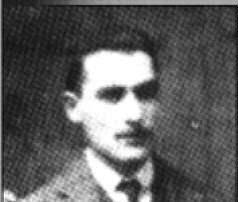JAROSLAV KACZMARCZYK (1885-194?)
Copyright 1995 by Bohdan Horbal and Carpatho-Rusyn American, Vol. XVIII, No. 2, Summer 1995. All Rights Reserved

Jaroslav Kaczmarczyk is regarded by Lemkos in much the same way as Americans view George Washington. While Kaczmarczyk's efforts at attaining self-determination for Lemkos did not succeed, he is nonetheless credited as one of the few who successfully drew international attention to the rights and aspirations of Carpatho-Rusyns in the Lemko Region of historic Galicia.
Jaroslav Kaczmarczyk was born in 1884 in the Lemko village of Binczarowa. His father was the renowned priest and Rusyn community activist, the Reverend Teofil Kaczmarczyk (see C-RA, Vol. XVIII, No. 1, 1995, p. 3 [online soon]). Teofil served as a model and inspiration to the young Jaroslav, who devoted most of his early years studying hard and eventually earning a PhD in law from the University of L'viv. During World War I, Jaroslav served in the Austro-Hungarian army. Following the end of the war and the collapse of Austria-Hungary, Lemkos together with their Carpatho-Rusyn brethren south of the mountains, and like many other peoples in east-central Europe, saw the fluid postwar international environment as an opportunity to decide their own political fate. Consequently, Kaczmarczyk and other Lemko activists (primarily Greek Catholic priests, teachers, lawyers, and peasants) started an organized Lemko political movement in the Carpathians. The result was a large meeting in the Lemko village of Florynka on December 5, 1918. Kaczmarczyk and other Rusyn leaders from both sides of the Carpathians declared: "We want neither Hungarians nor Poles, and we do not recognize any Ukraine." Instead, they decided to create their own Rusyn councils in order to govern and administer the region. Within weeks, several councils sprang up throughout the Lemko Region.
During this period Kaczmarczyk headed the Rusyn Council (Russka Rada) in his native village of Binczarowa. Like many Lemkos of his day, he felt a strong cultural affinity toward Russians and he advocated political union with Russia. Since at the time this was politically unrealistic, Kaczmarczyk and others supported instead union with Czechoslovakia as a temporary political expedient until such time as they could unite with Russia. In January 1919, Kaczmarczyk assumed control of the Grybow county Rusyn Council. Before long, however, he became leader of the entire Lemko Region and eventually president of the Lemko Republic. The Grybow Rusyn Council that he headed was recognized by Lemkos as the governing authority of the region.
The government of the newly-independent state of Poland had other plans, however, and it decided to take control of the Lemko Region. This led to numerous conflicts. Hundreds of Lemkos who were called to serve in the Polish army fled abroad with the army in pursuit. Lemkos were also expected to provide material support to the Polish military in the form of clothing and food. Kaczmarczyk's Council refused such demands and advised the Lemko population to follow suit. In attempting to address and mediate this increasingly difficult situation, Kaczmarczyk met in March 1919 with both Lemkos and Poles. As a result of his efforts, in June the Polish military command in Tarnow ordered that Lemkos be exempted from service in the army.
By the fall of 1919, however, Lemkos were again being drafted into the Polish army. Together with the Rusyn-American immigrant, Victor P. Hladyk, Kaczmarczyk travelled to Warsaw to discuss this matter with Polish military officials. Another promise to cease drafting Lemkos was offered, but again it was not kept. Lemkos were with increasing frequency being beaten or even killed for resisting the draft. As the situation deteriorated, the Polish secret police placed Lemko activists under surveillance. In early 1920, Kaczmarczyk publicly declared in Gorlice that the Lemkos had a right to self-determination in their national affairs. He raised this issue in Florynka in March 1920, but this turned out to be an exercise in futility. Lemkos simply had neither the political nor military power necessary to implement their self-declared rights. Finally, in September 1920, the Polish military command formally ordered the full integration of Lemkos into the Polish Army. At first many Lemkos were reluctant to join, but with time more and more did so.
The fate of the Lemko Republic was decided at the outset of 1921. On January 8, Kaczmarczyk was arrested and put on trial six months later. Kaczmarczykdefended himself and his activities by emphasizing that he was following the wishes of the Lemko people; was attempting to uphold Wilson's principle of self-determination for all peoples; and was working to live in friendly relations with Poles. In the end, he was acquitted of all charges and set free.
After his release, Kaczmarczyk opened a legal practice in the Lemko Region town of Muszyna. From this point on, he ceased to be a force in Lemko community life. He did resurface briefly during a visit to the United States in 1923, but he turned down an invitation to head the Lemko Congress in New York. Kaczmarczyk's departure from public life dismayed many Lemkos. It is likely that he was disillusioned and exhausted after the intense and disappointing events of 1918-1921. After 1923, not much is known about Kaczmarczykother than that he continued to be active in the legal profession at least until the outbreak of World War II in 1939. Despite his early retirement from political life, Kaczmarczyk and his patriotic activity on behalf of Lemkos at the close of World War I continue to be remembered and held in high regard.
Bogdan Horbal
New York, New York